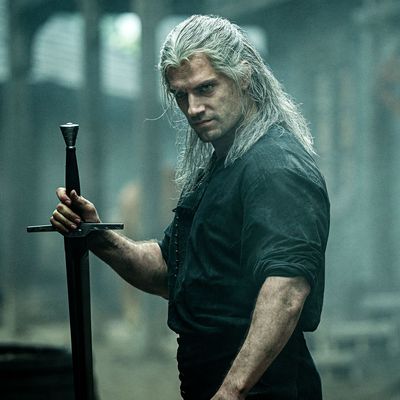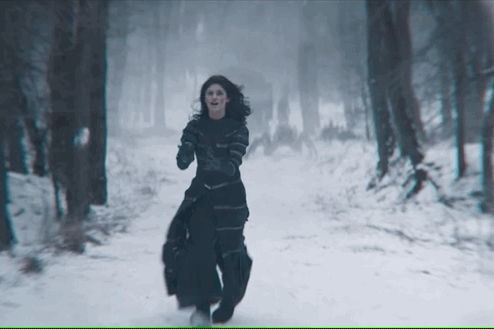
The Witcher, a sprawling Netflix fantasy series that catapulted itself into massive popularity since premiering three weeks ago, is a show that makes no sense. You can’t talk about The Witcher without starting there, because its illogic is the first thing you confront when you start watching, and it’s what you’re still grappling with when the season ends eight episodes later.
But the other thing to say about The Witcher, which is just as important to say right up at the top, is that it’s really fun. Its fantasy trappings and its large audience makes it sound like Game of Thrones, but where that show was marked by bleakness, The Witcher is full of goofy absurdity and catchy tunes. If The Witcher is an indication of what viewers want in the successor to Game of Thrones, then what viewers want is more silliness. Watching it is like riding a roller coaster that short-circuits your higher-order thinking, bypassing reason entirely in favor of spectacle. It is immeasurably stupid; it is extremely enjoyable. And instead of opposing each other, The Witcher’s storytelling works by making those two qualities fuel each other.
The Witcher’s incoherence is pervasive, disorienting, and absolute. The first season is told in three timelines: There’s one with a young girl named Ciri who wanders through the wilderness; in another, a disabled woman named Yennefer is rescued from a life of obscurity and becomes a powerful witch; in the third timeline, a mutant named Geralt of Rivia — the witcher himself! — earns money as an itinerant monster slayer. But The Witcher never explains that it’s telling a story in three timelines. There are few markers to clarify which scenes belong when. The same characters appear in multiple timelines, and scenes from each timeline do not appear in chronological order. If the express intent of the show is to leave you bewildered and disoriented from scene to scene, it’s hard to imagine a more efficient way of doing it.
And yet, The Witcher finds ways to make even less sense! The TV series has two source texts, a video-game franchise and a series of fantasy books by Andrzej Sapkowski. Between them, the books and the games establish a large and complicated fantasy world, full of arcane rules about magic, political rivalries, and cultural prejudices. The TV series uses all of these things; it explains none of them. There’s something called the law of surprise! There’s a threat from a place (community?) called Nilfgaard! For some reason, Geralt keeps drinking from tiny vials during fights! There are elves, but there’s no explanation of who they are or what they can do! There’s very little discussion about what, precisely, a witcher is!
One plot kicks off with Geralt searching for a djinn, telling his bard companion Jaskier that he needs the djinn to cure his insomnia by granting him a wish. This comes out of the absolute blue. It’s not just that The Witcher hasn’t explained how a djinn works in its world, or mentioned that Geralt has suffered from insomnia, or given viewers any way to know when this is happening. There’s no sense of whether any of this matters, or to what degree it might. Is Geralt just being grumpy, or is this meaningful? Why is Jaskier still there? Do Jaskier and Geralt like each other at this point? Is it a coincidence when they later run into Yennefer, or does her presence suggest something more nefarious? What is Geralt going to do with his other two wishes from the djinn? What does Geralt even want?
If this kind of disjointed, groundless plottiness were a onetime thing, it could be written off as carelessness. But on The Witcher, making no sense is the rule, not the exception. The stories proceed from one beat to the next without ever pulling together in an organized plan. When the show does finally get around to establishing some basic character motivations, it happens near the end of the season, long past the point when they would’ve been useful guidelines. Every time I started a new episode of The Witcher, I checked to make sure I hadn’t somehow skipped an episode. Every time an episode ended, I scanned back through what I’d just watched to check if I’d blacked out during the bit that explained any of this. There are a couple episodes of The Witcher I’ve watched three times. Logic never comes.
All of this is also what makes the show so beguiling. When there’s no guidance about what matters in a story, no measure of how much time has passed, and no steady connection from one story to the next, there’s nothing left to do except latch on to what’s immediately in front of you. Watching The Witcher is like being forced into an eternal present, like meditating or being in a coma. Cut free from the restrictive bonds of stuff like “cause and effect” or “consistent characterization,” The Witcher becomes a collection of loosely related fragments. It’s a stream-of-consciousness series, like listening to a toddler play make-believe, if the toddler was really into fantasy tropes and Henry Cavill’s musculature.
The Witcher is certainly helped by its genre, which is full of building blocks both familiar (dragons) and freeing (magic can work however you want it to). Its sense of humor also gives the show a leg up in the fun department: There doesn’t need to be any explanation for why Geralt’s trying to catch a djinn, because that’s what seems most amusing right now. A song like “Toss a Coin to Your Witcher” fits well within the fantasy genre, but it’s also got some really catchy gibberish lyrics. Still, fantasy stories are rarely this scattered. They rarely spend so little effort on world-building details or internal logic. The Witcher may be playing in familiar territory, but cutting the big fantasy map to pieces, throwing it into the air, and hardly caring where the fragments fall down feels like something new.
The fragments, as separate pieces, are extreme and overwhelming: orgies and horrible monsters and gruesome transformations. The Witcher can’t just have a dragon; it has to be a golden dragon. But as a whole, those fragments are compelling because they’re a highlight reel of the show’s most over-the-top bits: the battles and the sex scenes and the guy who gets eaten by a wild beast while trying to relieve himself in the woods. It’s all scrambled and arranged by what will make the most striking tableau, rather than what will tell a story. The Witcher is fun because it’s a collage of itself.
There’s a sequence in episode four, “Of Banquets, Bastards, and Burials” where Yennefer, a witch whom we last saw triumphantly walking into a party after being painted with the charred remains of her own uterus in order to transform into a hot person, leaps through a magical portal with a mother and baby she’s been charged to protect. They’re pursued by a monster, and Yennefer keeps opening portals and pulling them through to some new wild landscape. City, desert, forest, mountain: As soon as you know where they are, the portal opens and they leap away again.
You might say this is a metaphor for how The Witcher works — the frantic momentum, the way your brain registers an impression of a place but no details — but that would be giving The Witcher both too much and too little credit. It’s not a perfect little encapsulation of the show’s design. It’s just a heedless flurry of impressions (monster! baby! portal! weeping!), before the show finishes with that bit and then moves on to something else. It’s so ridiculous and so easy to dismiss. But wow, watching a witch jump through all those portals to save a nameless baby from a nonsense monster is really entertaining.



